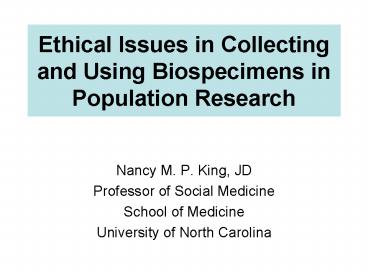Ethical Issues in Collecting and Using Biospecimens in Population Research - PowerPoint PPT Presentation
1 / 14
Title:
Ethical Issues in Collecting and Using Biospecimens in Population Research
Description:
Repository/researcher states plan: Consent form ... Repository/researcher must monitor choices. Tailored consent forms: ... Researchers' duty to explain design? ... – PowerPoint PPT presentation
Number of Views:76
Avg rating:3.0/5.0
Title: Ethical Issues in Collecting and Using Biospecimens in Population Research
1
Ethical Issues in Collecting and Using
Biospecimens in Population Research
- Nancy M. P. King, JD
- Professor of Social Medicine
- School of Medicine
- University of North Carolina
2
Biospecimens in Research Issues to Address
- Genetic vs. non-genetic specimen/biomarker
research - Informed consent
- Storage future research sharing data and
specimens recontact (for new research or with
results) - Confidentiality
- Potential benefits/risks of harm?
- Vulnerable populations, sensitive issues
3
Biospecimens in Research Design Considerations
- Design of Research
- The value of the research question
- The reason for collecting biospecimens
- Methodology and validity of data obtained
- Linking biospecimens to other information
- Survey research information
- Medical records
- Other records (education, employment, criminal)
- Other people (relatives, unrelated neighbors)
4
Biospecimens in Research Consent Issues
- Informed Consent
- Information and process
- Explaining research purpose and data use
- Sensitive questions
- Individual or group implications?
- What to disclose and how
- Community advice/Cultural humility
- Specimen storage
- Future uses and data sharing
- Scope of consent
- Recontact required?
- Consent is necessary, but not sufficient!
5
Biospecimens in Research Data Dissemination
- What does biospecimen data measure?
- How do the results help address the problem
identified? - Investigator responsibility
- Public explanation
- Information for subjects
- Unexpected findings
- Stigma or discrimination?
- Ongoing relationship
- Recontact about results
- Clinical significance?
6
Genetic Biospecimen Research
- Multigenic disorders and conditions
- Exploratory research, probabilistic findings
- Public health implications? (heart disease,
cancer, diabetes, mental illness) - Population genetics
- Fishing expeditions?
- Interpreting risk factors
- Behavioral genetics
- Soft findings, uncertain meaning
- Stigma? (alcoholism, violence, criminality,
risk-seeking behavior, homosexuality) - Gene-environment interactions
- Predisposition and risk reduction
- Prevention or blame?
7
Genetic Research Ubiquitous Ethical Issues
- Genetic essentialism vs. uncertainty
- Genetic determinism vs. personal responsibility
- Genetic discrimination risks employers, insurers
- Genetic information is also information about
others choosing to know or not to know - Genetic privacy vs. public health/family
interests - Race and risk
- Problematic categories, varying measures
- Biology vs. society
- Stigma and discrimination
8
A Distinction Without A Difference?
- Whats different about genes?
- Linking specimens with other information
- Medical records (current, or also future?)
- Nonmedical records (school, work, DMV, criminal?)
- Other studies
- Environmental data
- Design disclosure (what, why, how?)
- Sharing and selling of information
- Disclosed to subjects?
- Controlled by subjects?
- Saving, perpetuating, and pooling specimens
- Genes may be different, but most issues arent!
9
(No Transcript)
10
Biospecimen Repositories Ethical/Policy
Considerations
- Informed consent/waiver of consent
- Secondary/future uses of specimens, data
- Privacy vs. confidentiality
- Data/specimen security
- Data/specimen sharing
- Ownership and financial gain
- Data disclosure
- Oversight of repositories
11
Secondary and Future UsesScope of Consent
- Repository/researcher states plan
- Consent form describes plan for secondary/future
use - Subject agrees/declines to participate under
stated conditions - Research subject selects preferences
- Consent form provides options
- Repository/researcher must monitor choices
- Tailored consent forms
- To reflect level of identifiability
- To describe system delinking specimen and
information - Simple consent where no recontact possible
- Separate consent forms for recontact
- IRB decides when reconsent is required
12
Waiver of ConsentExisting Specimens, New
UsesAgreement/Near Agreement
- Study must be minimal risk
- Mechanism exists to protect privacy and
confidentiality - No disclosure of research information
- No conflict with original consent form
- Sound mechanism to unlink identity
- Waiver does not conflict w/state, federal laws,
customs - Waiver does not harm others--family, individuals
of similar social, ethnic group or community
13
HONEST BROKER MODEL (Dressler, 2004)
14
A Case Example
- Havasupai Tribe Case
- Diabetes is the problem is genetic research the
solution? - Genetic/nongenetic uses of biospecimens other
data - Researchers duty to explain design?
- From diabetes to schizophrenia to migration
patterns monitoring? reconsent? - Ownership and sharing researchers vs. donors
- Linkage with other data consent needed?
- Group vs. individual harms
- The crazy tribe
- Challenging creation stories
- Duties fair subject selection, nonexploitation
- Duties respect, transparency, humility
- Duties education, shared goals, reciprocity































